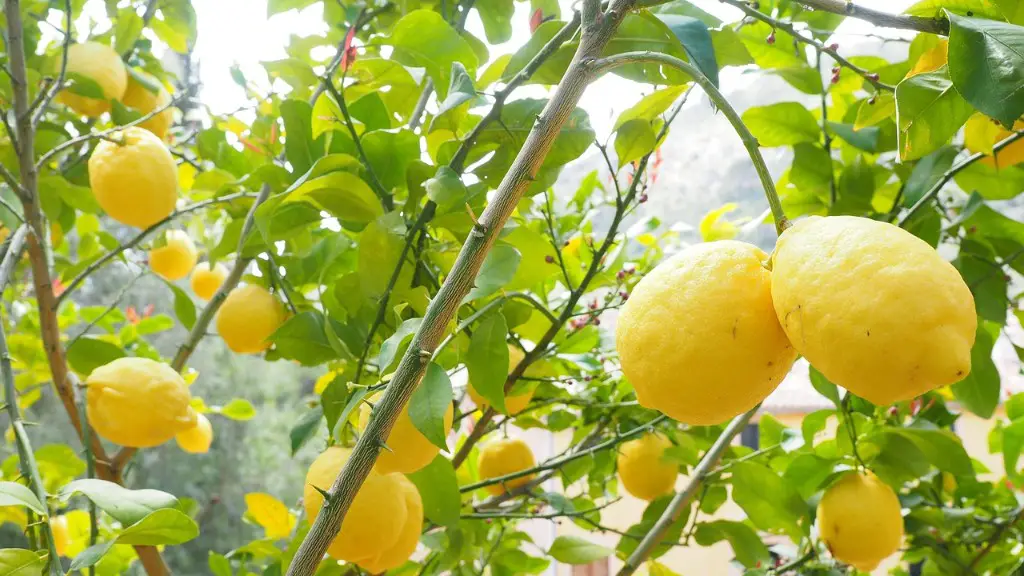Wintertime can be difficult for some plants, including lemon trees, and with the cold temperatures, it is important to give them the proper care and protection when winter hits. Knowing the best way to look after a lemon tree in winter is key to ensuring that your planting is healthy and ready to produce abundant fruit in the spring. Here are a few tips on how to take care of a lemon tree during the winter months.
First and foremost, your lemon tree needs to be protected from cold temperatures, frost and snow. If it is a frost-prone area, cover the tree with a sheet or a tarp, or move the tree to a sheltered spot. To guard against extreme cold, you can also wrap it in a blanket or a burlap cloth. Additionally, be sure to provide the tree with enough water to keep the soil moist, but not soaking wet.
Second, use a pruning shears to trim away any dead growth or damaged branches from the lemon tree. This will ensure that there is good aeration and more sunlight access for the interior of the tree. When cutting away dead branches, make sure that the cuts are kept to a minimum and precise, and prune away any stems that are less than a ¼ inch in diameter.
Third, add a layer of mulch or compost around the lemon tree to help protect the roots. The mulch will act as an extra layer of insulation, locking in moisture and providing nutrients to the soil. Furthermore, to the mulch or compost, you can add some slow-release fertilizer to ensure that the soil stays healthy.
Fourth and finally, it is important that the lemon tree is not exposed to direct wind as this can cause severe damage to the branches and leaves. If you spot damaged or discolored leaves, spray them with an insecticidal soap solution. This should provide relief and help the leaves to heal.
Lemon Trees and Frost
Frost can be particularly damaging to citrus trees, especially lemon trees. To prevent frost damage, lemon trees should be covered with a tarp or a sheet when temperatures dip below freezing. It is also advisable to provide your tree with extra irrigation during the cold months, as this will help to keep the soil warm and boost the tree’s endurance. Additionally, make sure to cover your lemon tree as soon as temperatures begin to drop since even a light frost can cause damage.
Plant Health and Fertilizing
For lemon trees to thrive, they need to be planted in fertile, nutrient-rich soil. If you choose to fertilize, use an organic fertilizer since chemical fertilizers can be harmful to the roots of the tree. As for soil types, loam is a great option for lemon trees since it has good drainage, plenty of nutrients, and holds water well. When fertilizing, use a slow-release fertilizer and feed the tree at least once a month during the winter months.
Pruning and Winter Sunlight
When the weather begins to turn cold, the lemon tree should be pruned of dead or damaged branches. This will help keep the tree aerated and increase the amount of sunlight that the tree receives. When pruning, it is important to make sure that the cuts are precise and use only a pruning shears. Any stems that are less than ¼ inch in diameter should be pruned away in order to keep the tree healthy.
Pest Control
During the winter months, lemon trees can be prone to pests like aphids and mealybugs, which can cause damage to the leaves and branches. To keep pests away, spray the lemon tree with insecticidal soap or an organic pest control product. If you spot damaged or discolored leaves, spray them with an insecticidal soap solution, as this will provide relief and help the leaves to heal.
Watering and Mulching
It is important to keep the soil of your lemon tree moist but not soaking wet during the winter months. As such, it is important to pay close attention to the moisture level of the soil and water your lemon tree when necessary. Additionally, adding a layer of mulch or compost around the tree will help to lock in moisture and provide nutrients to the soil. Make sure to water and mulch regularly, as this will ensure that your lemon tree is growing healthy and strong.
Protecting Trees from Wind
Lastly, your lemon tree should be kept out of direct winds which could cause damage to the branches and leaves. If your tree is exposed to strong winds, you can install a wind break or use a stake or trellis to help shield it. Additionally, be sure to keep any furniture, vehicles, or other items near the lemon tree that could cause damage if blown away.

